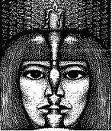So one might ask, if this is such a partnership, why is it that it is Isaac's prayer that was recorded & heard by God. Most commentaries state that his prayers were heard because he was the son of a saint, whereas Rivka is the daughter of a rasha, an evil man. The poem I'm about to share ponders an additional possibility as to why it was necessarily Isaac's prayer that brought about the conception.
But first, let's look briefly at a little of what we know about Isaac's psychological makeup. Later in the parsha we read of how Isaac's eyes grew dim in his old age. The Midrash explicitely links Isaac's blindness to his experience of being bound upon the altar of Moriah. It records that angels witnessing the binding wept tears that dropped into Isaac's eyes and that these very tears caused his blindness in later life.
Aviva Zornberg likens his blindness to a type of psychological vertigo. She notes a remarkable phenomena where people who suffered through traumatic experiences earlier in life, are in later years found to suffer from actue problems with their vision. It is as if their suppressed vision expresses their years of repressed emotion. Manifesting a desire to unsee all the horrors that they had witness. According to this, their blindness is an indicator of trauma left unprocessed or unprocessable.
And so we return to the scene of Rivka and Isaac's prayer. In keeping with an honest face-to-face, Rivka in this poem urges her husband to do the laborious work of processing his own trauma and rising above his unconscious fears of parenting. She invites him to confront his resistance to generating his Toldot, his future generations. Indeed, the opening & title of the parsha, “Toldot Yitzchak”, the Generations of Isaac, could thus be seen as a testimony to his successfully stepping up to the task of continuity and childrearing in the face of and despite his all-too-traumatizing childhood.
Rivka's Request
You were broken like
porcelain
Dashed against a desert
Shattered neath a father's
dagger
and a flinty mirror streaked
with tears
dripped
not blood
but blindness
into your grey hairs
your pieces plastered
back together
hold me tender
a fragile tendon
- tiptoed to the next generation
you, the quiet casualty
of your father’s spiritual ambitions
perhaps you fear
that G-d demand
you do the same
if you were to father
your own ambitions
- would you?
Or would you rather
-pray-
pray for me
here where you were
born up
and tornup
on that unforgiving rock
beneath an angels eye
and ram’s horn
fortuitously caught
Would you pray a future
to fill this vacant womb?
Would you pray for continuity
would you – continue?
And tell me, husband dear,
can you eye your own
resistance
and defy your very fears
forgo the blindness
that has plagued you
and face your own
descendants
with a faith
that here
is holy
and life
is weighty
and no more waiting
for safety
but rather brave the gaze
of a world that is
crazy
beautiful
and full of grace
and shun the blade
that bids you to
accuse your father
or mourn your mother
or resent your God
or blame anyone other
than yourself
for your own debilitating
fears
for the hand that
you are dealt
is but yours to
commandeer
so let's move on
to making our own
glaring
parenting
mistakes
to risking inflicting
some untold & unending
trauma
onto our children
and with a
well-intentioned will
sacred and sincere
let us lift our prayers
to God's receiving ears
With the knowledge
that beyond old traumas
and emotions on the mend
there is meaning
to the riddle
of Moriah
though our tongues
are twisted
and our eyes are dimmed
Come, husband
to this field
and hunt down
one good prayer
For the fixing of your
childhood
is through fathering
your children
…if you dare.

 RSS Feed
RSS Feed
